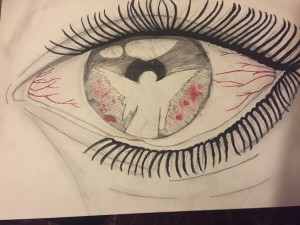There’s a woman in the room, although oddly familiar she is still a stranger. It is very intriguing watching her struggling to break free of the strangling ropes that bind us, how silly it is seeing her indulge her madness.
John, that is the name spoken from her lips, this man he loves her, or so it seems. I hear bits and pieces of their conversations, sometimes they make sense sometimes not. She shares her fears he shoots them down, he tries to save her. Is that not love? Even so, I can see the cracks starting to form on her countenance as she continues to divulge into her madness, which is slowly becoming more apparent.
He says, “There is nothing so dangerous, so fascinating, to a temperament like yours. It is a false and foolish fancy. Can you not trust me as a physician when I tell you so? ” She quiets down, but it doesn’t look as if she’s fighting her thoughts, she entertains them, feeds them. Foolish girl! Can’t you see there is no breaking free?
She writes a lot; I always see her writing in secrecy with the madness creeping out of her and seeping into the pages, her foolhardy thoughts out in the open for anyone to stumble upon. The cracks are quickly spreading all over her frail body, I am legitimately concerned seeing her thoughts pushing to break free to pierce into the room and consume the air.
She is much calmer during the daytime and more frantic at night. At night she sees me; am I a threat to her or is she a threat to me? John isn’t around much anymore. Can’t she see she is neglecting her duty of love for him? There is another woman, John’s sister, keeping her keen eyes on her, Jennie. Can Jennie see the madness that I can see in her clearly now, it’s a shade darker than any black I have ever seen. It swells inside her, building momentum and seeping out of the now countless cracks.
The black has now completely consumed her seeping out in a frantic rhythm. She’s coming closer, what is this? I cannot help but laugh loudly, I reckon she must have heard it. She is attempting to tear the barrier away. She is indeed the ‘Silly goose’ John claims her to be. This barrier is unbreakable. I will not allow her to consume me, I am happy where I am. This place is where I must remain, it is the only way for me to fulfill my purpose. For the life of me I cannot recall what this purpose is but I must remain here. I am sure of it. She promises to try again. There aren’t any worries on my part, she will never succeed. They never do.
She’s more frantic than ever, peeling off more of the barrier. My pleas are fallen to deaf ears as she desperately tries to break the barrier. Her duties, my duties long forgotten. She is me. I am getting angry enough to do something desperate. To jump out of the window would be admirable exercise, but the bars are too strong even to try. Besides I wouldn’t do it. Of course not. I know well enough that a step like that is improper and might be misconstrued. I don’t like to look out of the windows even- there are so many of those creeping women, and they creep so fast. I wonder if they all come out of that wallpaper as I did? But I am securely fastened now by my well-hidden rope – you don’t get me out in the road there ! I suppose I shall have to get back behind the pattern when it comes night, and that is hard! It is so pleasant to be out in this great room and creep around as I please!
I don’t want to go outside. I won’t, even if Jennie asks me to. For outside you have to creep on the ground, and everything is green instead of yellow. But here I can creep smoothly on the floor, and my shoulder just fits in that long smooch around the wall, so I cannot lose my way. Why there’s John at the door!
It is no use, young man, you can’t open it! How he does call and pound! Now he’s crying for an axe. It would be a shame to break down that beautiful door! “John dear!” said I in the gentlest voice, “the key is down by the front steps, under a plantain leaf!”
That silenced him for a few moments. Then he said–very quietly indeed, “Open the door, my darling!” “I can’t,” said I. “The key is down by the front door under a plantain leaf!” And then I said it again, several times. very gently and slowly, and said it so often that he had to go and see, and he got it of course, and came in.
He stopped short by the door. “What is the matter?” he cried. “For God’s sake, what are you doing! ” I kept on creeping just the same, but I looked at him over my shoulder.
“I’ve got out at last,” said I, ” in spite of you and Jane? And I’ve pulled off most of the paper, so you can’t put me back! ” Now why should that man have fainted? But he did, and right across my path by the wall, so that I had to creep over him every time!




